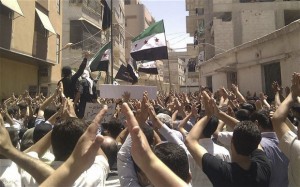Arming Syria's Rebels Could Lead to a Massacre of Syrian Religious Minorities

"I'm glad that some of the nations of the Gulf, the Saudis, are providing some weapons ."
Thus spoke one-time Republican presidential candidate John McCain as a prelude to his own call for the United States to arm Syria's rebels. Although he has made such calls for months now, one has to wonder how long it will be before it comes to fruition.
But another question is this, What will happen if the Free Syrian Army is provided Western arms? How does exacerbating and prolonging the uprising not inevitably lead to regime change? What happens after Assad falls? What will post-Assad Syria look like? Will it peacefully co-exist with its Jewish neighbor and be a partner with the United States? Or will it look like so many other Middle Eastern countries where intervention and decapitation of the leadership led to ethnic strife and civil war?
Reporting on the details of the late May massacre in the western Syrian town of Houla has been slow. The German-language news site FAZ was the first to break the news that it was indeed elements of the resistance, not Assad's army, that killed at least ninety. The grisly details may be a window into what is in Syria's future.
According to the FAZ report:
"Those killed were almost exclusively from families belonging to Houla's Alawi and Shia minorities. . . . Several dozen members of a family were slaughtered, which had converted from Sunni to Shia Islam. Members of the Shomaliya, an Alawi family, were also killed, as was the family of a Sunni member of the Syrian parliament who is regarded as a collaborator."
If the Houla massacre is any indication of what post-Assad Syria beckons, ethnic reprisals appear to be the name of the game. It could very well have been an isolated incident but the targets of the massacre tell the tale. Not random targets, the Houla region is 90% Sunni yet the victims were almost entirely among the Shia and the minority ruling Alawi clan. If the Alawite regime falls how likely is it that a bloodbath will ensue against the once-dominant minority? And as fellow recipients of protection from the Assad regime for years, the ancient Christian community might also be on the radar for "cleansing."
According to the Vatican's Fides news agency, mosques in the western Syrian town of Qusayr have issued an ultimatum that Christians must leave the town, a threat whose deadline passed on Friday. Reports also include the desecration of churches and the murders of Christians. There is no solid evidence that such behavior is sanctioned by the Free Syrian Army - even the FSA's Western apologists admit that it's an opaque entity of disparate elements - but it does little to assure conscientious observers that the result of backing these rebels will bring democracy, tolerance, and secularism.
In addition to McCain, Senators Joe Lieberman and Marco Rubio have been the most vocal proponents of arming the rebels. Members of the Old Guard, McCain and Lieberman are on their way out of the senate. But to this point in his young senate career, Rubio has positioned himself as their successor, as both representing the status quo in foreign policy, but more specifically, as the senator who will faithfully support intervention in any corner of the world, regardless of whether any threat to American security exists.
But just as Rubio is one of the loudest supporters for arming the Syrians, a proposition likely to devastate his co-religionists, he appeared Thursday at the Faith and Freedom Coalition Conference in Washington to talk about the American gospel of low taxes, not about the threat that such a policy poses to Syrian Christians, a topic one might expect to come up at such a conference.
Matters of religion ought not to dictate American foreign policy. After all, America has fought wars against Christian countries from Great Britain to Germany to Spain. But without an identifiable American national interest in Syria, might it be useful for American Christians to ask themselves if the potential destruction of their own "brothers and sisters in the faith," as they would call fellow Christians in Syria, is an appropriate policy for their "Christian" country to follow?




